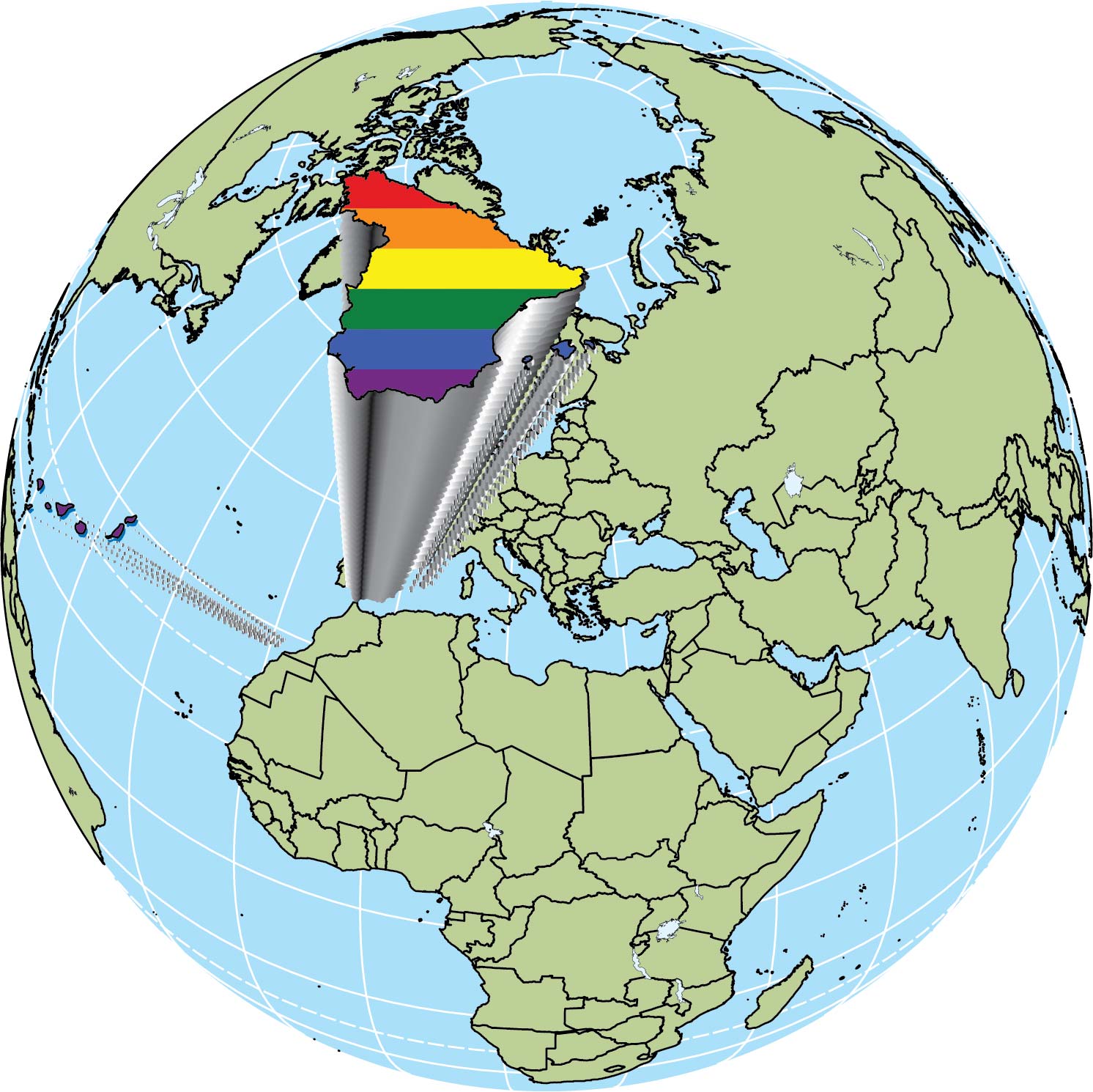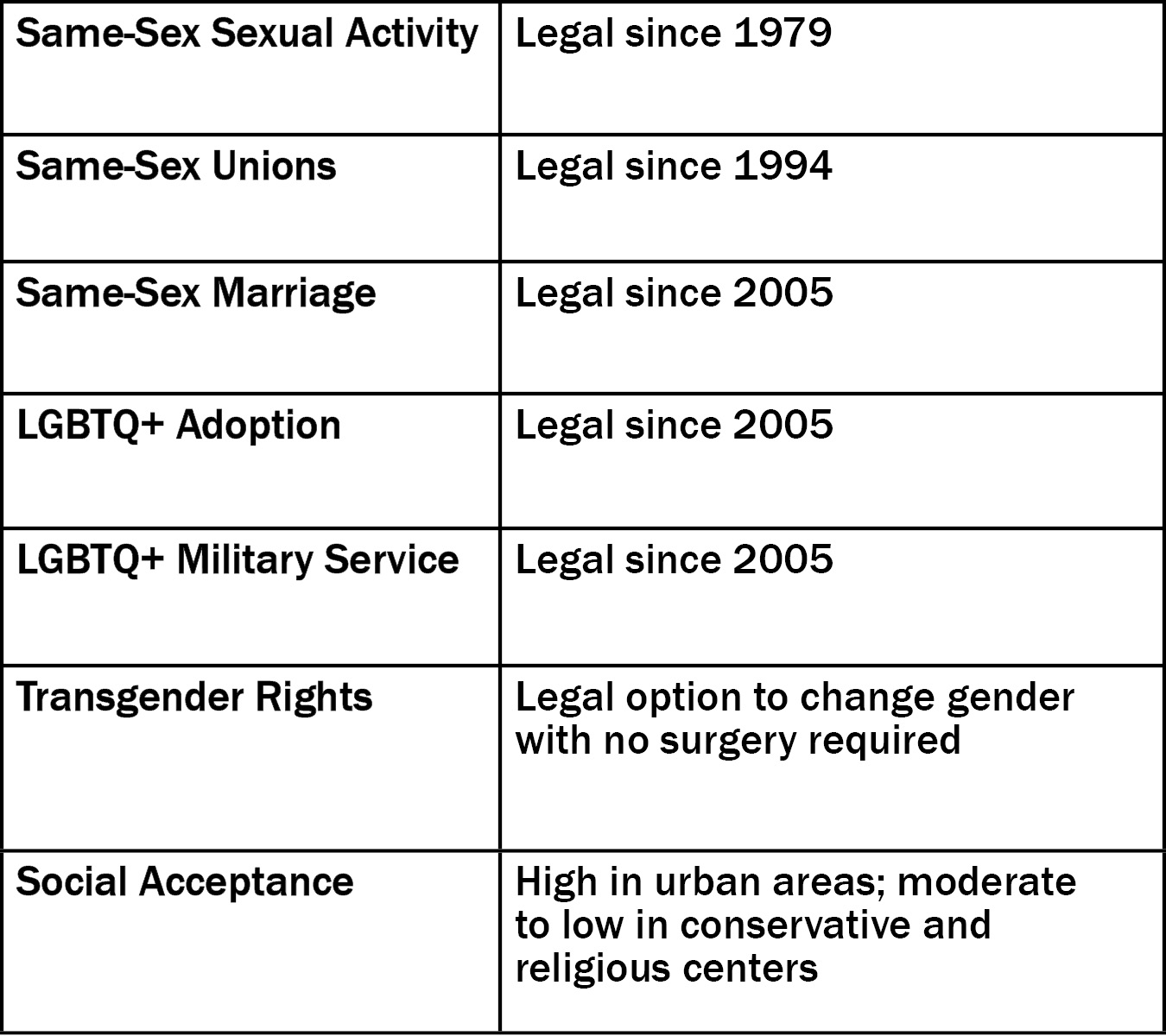LGBTQ: Legal and Cultural Status
Over the past few years, the LGBTQ+ community has been the beneficiary of a marked shift in global public opinion, with movement towards greater cultural acceptance and enhanced legal status. Nevertheless, views are not uniform across all countries.
In the most progressive countries, members of the LGBTQ+ community enjoy cultural acceptance, social freedoms, and full legal status. In the most restrictive countries, identifying as LGBTQ+ or engaging in same-sex acts is punishable by jail or death.
When preparing to travel abroad as a tourist or for business, members of the LGBTQ+ community should thoroughly research country-specific legal, cultural, and security issues prior to departure.
Understanding where a destination country falls on the spectrum of acceptance allows LGBTQ+ individuals to decide whether to travel to a given destination and to understand how to conduct themselves safely when they arrive.
Legal Facts
Same-Sex Sexual Activity
Between 1822 and 1954 same-sex sexual activity was legal in Spain. There were laws which allowed for the incarceration of LGBTQ+ individuals, but sexual acts were technically legal. This was changed by the administration of Francisco Franco who, in 1970, passed Ley de Peligrosidad y Rehabilitación Social (Law on Danger and Social Rehabilitation). This law criminalized same-sex sexual activity. In 1979, this law was reversed, and same-sex sexual activity was once again legal.
Same-Sex Unions
The Ley de Arrendamientos Urbanos (Law on Urban Leasing), was passed in 1994. This law allowed for the creation of a registry of same-sex couples throughout Spain. Becoming registered allowed LGBTQ+ individuals to enter into legally recognized unions, though those unions offered very few legal benefits and were mostly symbolic.
Same-Sex Marriage
On July 1st, 2005, Spain’s legislative chambers, the Cortes Generales, approved a measure to add new language to the existing law regarding marriage. The amendment said: "Marriage will have the same requirements and results when the two people entering into the contract are of the same sex or of different sexes." This language legalized gay marriage, making Spain the fourth country in the world to do so.
Adoption
Once Spain’s legislative chambers, the Cortes Generales, legalized same-sex marriage, adoption rights were automatically extended to married LGBTQ+ couples. This occurred on July 1, 2005.
Military Service
Following the legalization of same-sex marriages, the Spanish Armed Forces amended their policy to allow LGBTQ+ individuals to serve. The Spanish Armed Forces also at that point allowed for same-sex service members to cohabitate during service. This made the Spanish military the first European police force to allow for the cohabitation of same-sex couples.
Gender Identity Laws
On March 17, 2007, the Cortes Generales passed the Law Governing Sex Registry Information Rectification. This law allowed for transgender individuals in Spain to legally change their gender without undergoing surgery. However, the law still requires transgender individuals undergo at least two years of medical care to aid in a biological transition, and they must have a professional diagnosis.
Anti-Discrimination Laws
The Spanish Criminal Code as it was established in 1995 imposes additional penalties for hate crimes. Article 15 states that any crimes motivated by a person’s sexual orientation or gender identity to be classified as hate crimes.
Article 314 of the Spanish Criminal Code states that Spanish workers may not be terminated from employment solely on the basis of their sexual orientation. While this language does not cover gender identity, case law has led to the inclusion of gender identity under this article.
Case law has also led to the inclusion of gender identity and sexual orientation within Article 14 of the Spanish constitution which guarantees equality of all Spaniards under law. This legal fact helps to extend constitutional protections equally to LGBTQ+ individuals in Spain.
Cultural Considerations
Public Opinion
Spain is considered one of the most accepting European countries toward LGBTQ+ individuals. More than 90 percent of the country believes same-sex marriage should be legal and that LGBTQ+ individuals should enjoy the same rights and protections as all Spaniards. A majority of Spaniards also support transgender individuals and their right to legally and socially identify as the gender of their choice.
Public Displays of Affection
In Spain, public displays of affection among all couples are common. The Spanish greet each other with kisses on the cheek, and there is a very open attitude toward being affectionate in public. Advertisements in Spain openly show physical affection between LGBTQ+ couples. Especially in urban centers, LGBTQ+ public affection is fully accepted. There are pockets of conservative, religious communities, especially throughout the quieter, more rural corners of Spain. There is much less acceptance of LGBTQ+ lifestyles in these areas.
Opinions on Cohabitation
The majority of Spanish citizens are comfortable with LGBTQ+ couples living private lives, and there are no widespread opinions condemning the cohabitation of these couples.
Consistency of Opinions
Spain is fairly consistent when it comes to the opinions of individuals toward the LGBTQ+ community. However, there are rural areas of Germany where more religious and conservative communities may be less welcoming.
Article written for World Trade Press by Taylor Holloran.
Copyright © 1993—2024 World Trade Press. All rights reserved.

 Spain
Spain 


